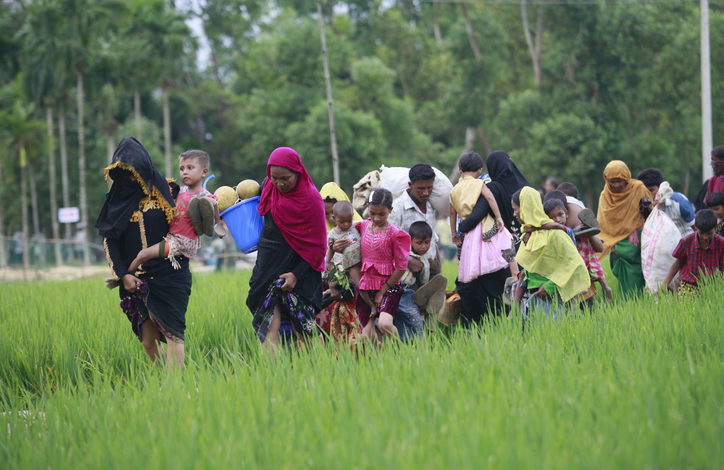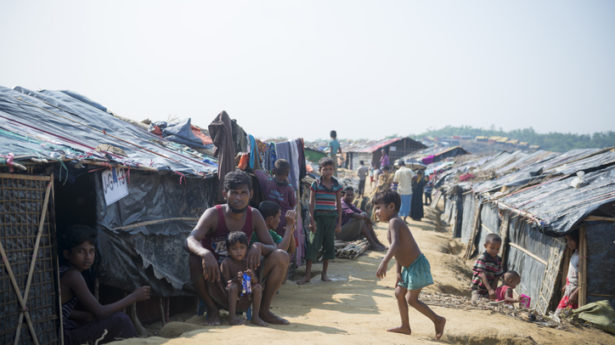The Unitarian Universalist Service Committee advances human rights through grassroots collaborations.
Congressional Action Needed After Latest Setback for Justice in Burma

By on April 25, 2019
The long quest for justice for the Rohingya minority in Burma has suffered a major blow. Myanmar’s Supreme Court rejected the final appeal of two Burmese journalists, Wa Lone and Kyaw Soe Oo, after they had been arrested in December 2017 in retaliation for their reporting for Reuters on the Burmese military’s crimes against the Rohingya. Both have been sentenced to seven years in prison under a colonial-era state secrets law.
The move by the country’s top court to uphold this blatantly unjust ruling is a devastating setback for press freedom and accountability in Burma. The journalists were engaged at the time of their arrest in an ongoing investigation into the Burmese military’s crimes against the Muslim Rohingya minority in Rakhine state in the summer of 2017. Several analysts concluded later that these crimes amounted to genocide.
The state’s retaliation and suppression of the journalists’ work signal the Burmese government’s continued unwillingness to expose the truth about these crimes or to prosecute the responsible high-ranking members of the military. This systemic impunity contributes to the likelihood of further atrocities and prevents Rohingya refugees from being able to return safely to their homes.
Fortunately, there is a path forward. Bipartisan legislation has recently been introduced in Congress that would press for the release of political prisoners in Burma and for greater accountability. For one, House members recently introduced the Burma Political Prisoners Assistance Act, which calls for the release of the detained Reuters journalists and other prisoners of conscience, while also providing increased support to Burmese civil society in the form of advocacy and documentation.
Furthermore, the Burma Human Rights and Freedom Act of 2019 (S. 1186), which was reintroduced in the Senate on April 11, would enact a number of measures to ensure justice in Burma, including targeted sanctions against Burmese officials responsible for crimes against humanity and other gross human rights violations. The bill would also designate new funds to provide humanitarian assistance to Rohingya refugees and other persecuted minority groups.
In addition, the bill would require the president to report periodically to Congress on diplomatic efforts to ensure that other countries honor the same targeted sanctions. This is a crucial measure, as other regional powers, such as China and India, are playing an increasingly significant role in Burma’s economy. Both are active specifically in Rakhine state, where new development projects threaten to erase the remains of destroyed Rohingya homes and to permanently set back refugees’ chances to rebuild their communities.
UUSC has actively supported this bill since a version was first introduced in 2017, as part of our ongoing initiative to support human rights in Burma. For the last several years, UUSC has worked with grassroots partners in Burma who are advocating for human rights, engaging in peacebuilding, and working for greater inclusion of the country’s ethnic minorities. The Burma Human Rights and Freedom Act is one way the United States can put pressure on the perpetrators of the violence and help create a better future for survivors of the genocide.
The success of this critical legislation is far from certain. Previous versions of this bill have so far failed to pass. Despite support from members of both major parties and the crying need for justice, Senate majority leader Mitch McConnell has in the past refused to bring the bill for a vote. This intransigence is a disturbing failure of moral leadership in the face of crimes against humanity.
Our legislators need to hear that meaningful action is long overdue. As racist settlement policies threaten to gobble up land that once belonged to displaced Rohingya communities, and as honest reporting on the atrocities is increasingly treated as a criminal offense within Burma, the truth about these crimes risks being cast down the memory hole. Coordinated sanctions of responsible individuals are needed now, in order to ensure that crimes against humanity never become a profitable endeavor or an acceptable activity in the eyes of the global community.
Photo Credit: iStock – Suvra Kanti Das

